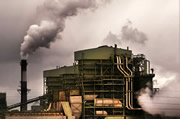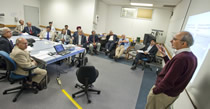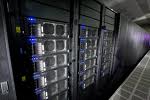


Waste heat: It’s when heat produced in a combustive process goes unused, dissipating into the air or water. Automobiles, industrial facilities and power plants all produce waste heat, and a lot of it. In a coal-fired power plant, for example, as much as 60 percent of the coal’s energy doesn’t go to power homes as electricity but instead disappears into thin air, waste heat wasted.
Over in Hearst Memorial Mining Building, assistant professor and Berkeley Lab materials scientist Junqiao Wu may be onto something. Wu knew from earlier research that a good thermoelectric material needed to have a certain type of density of states, which is a mathematical description of distribution of energy levels within a semiconductor. “We see a very promising future for this material, but first we have to show that it works better than existing materials,” Wu says.
Wu isn’t the only Berkeley engineer in thermoelectrics. Materials science and engineering professors and Berkeley Lab scientists Ramamoorthy Ramesh and Peidong Yang are both pursuing various lines of query. More>
 Three solid days of talks on feed-in tariffs, decoupling and demand-side management may not sound like exciting stuff to most people, but to a certain group of visitors from India, such topics could not be more welcome. Last week, a 20-member delegation, including representatives of electricity regulatory commissions of 13 of India’s 28 states, visited Berkeley Lab to learn about California’s leading efforts on energy efficiency and renewable energy. More>
Three solid days of talks on feed-in tariffs, decoupling and demand-side management may not sound like exciting stuff to most people, but to a certain group of visitors from India, such topics could not be more welcome. Last week, a 20-member delegation, including representatives of electricity regulatory commissions of 13 of India’s 28 states, visited Berkeley Lab to learn about California’s leading efforts on energy efficiency and renewable energy. More>
 DOE Undersecretary of Science Steven Koonin wrote in an op-ed in the San Francisco Chronicle published Monday: “China officially claimed the world's second-fastest computer earlier this month. China was in fifth place just six months ago—and is expected to have the world's fastest machine by year end. While its systems currently rely on U.S. components, China is already constructing comparable machines using its domestic technology. These challenges to U.S. leadership in supercomputing and chip design threaten our country's economic future.” More>
DOE Undersecretary of Science Steven Koonin wrote in an op-ed in the San Francisco Chronicle published Monday: “China officially claimed the world's second-fastest computer earlier this month. China was in fifth place just six months ago—and is expected to have the world's fastest machine by year end. While its systems currently rely on U.S. components, China is already constructing comparable machines using its domestic technology. These challenges to U.S. leadership in supercomputing and chip design threaten our country's economic future.” More>
 [SustainableBusiness.com] The U.S. EPA announced on June 7 that stand-alone data centers and buildings that house large data centers can now earn the Energy Star label. To earn the Energy Star label, data centers must be in the top 25 percent of their peers in terms of energy efficiency, as measured by EPA's energy performance scale. Berkeley Lab has been studying energy use in data centers for years, and the Energy Star data center label builds on this work. More>
[SustainableBusiness.com] The U.S. EPA announced on June 7 that stand-alone data centers and buildings that house large data centers can now earn the Energy Star label. To earn the Energy Star label, data centers must be in the top 25 percent of their peers in terms of energy efficiency, as measured by EPA's energy performance scale. Berkeley Lab has been studying energy use in data centers for years, and the Energy Star data center label builds on this work. More>
 Every two seconds someone needs blood. One donation can save the lives of up to three people. The Philanthropy Club will be hosting a blood drive in the Bloodmobile at the Cafeteria parking lot today from 7 a.m.-1 p.m. Please register for your appointment on-line. Sponsor code is LBL. First-time donors and walk-ins are welcome! For questions (or encouragement) please call Heather Pinto x4181.
Every two seconds someone needs blood. One donation can save the lives of up to three people. The Philanthropy Club will be hosting a blood drive in the Bloodmobile at the Cafeteria parking lot today from 7 a.m.-1 p.m. Please register for your appointment on-line. Sponsor code is LBL. First-time donors and walk-ins are welcome! For questions (or encouragement) please call Heather Pinto x4181.
The Lab will be migrating from Oracle Calendar to Google Calendar during the weekend of July 31. Interested calendar users and Google Guides are invited to attend a one-hour seminar from 1:30 to 2:30 p.m. this Wednesday in the Bldg. 50 Auditorium to hear about the calendar transition, including observations concerning the success of trial data migrations from Oracle to Google.
UC does not participate in the California State Disability Insurance (SDI) program. Our Short-Term Disability plan is available only to employees eligible for the Full Benefits package. New employees are automatically enrolled, and the plan is currently paid for by the University. Supplemental Disability pays a higher level of benefits for a longer period of time than the Short-Term plan. If you decide to enroll in the Supplemental Disability plan, you pay the premium. More>
Today
at Berkeley Lab encourages feedback and story ideas
Deadline for submissions is 10 a.m. two days prior to publication
TABL is produced by Public Affairs' Communications Group